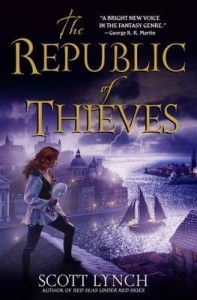At its core, “Republic of Thieves” is really a character study of Locke, which after being with him for two books is poignantly beautiful. He emerges out of the white-collar criminal into Locke the Human.
While we’ve seen snippets and snapshots of his humanity throughout the first 2 novels, Locke’s deepening relationship with Jean, and Sabetha’s return to his life brings out a push-pull to his character that we haven’t seen before.
As in his previous books, Lynch weaves the Bastards’ childhood stories in with their present predicament lending weight and meaning to Sabetha and Locke’s relationship as Locke hopes to rekindle their love after five years while simultaneously trying to defeat her in a political game set up by the Bondsmagi.
The “Game” is not really the plot of this book, which is a major difference from the first two novels in this series. This time Locke has zero interest in the contest’s prize. All he wants is Sabetha.
I need to take a side note to talk about their relationship: Lynch does a phenomenal job at writing strong female fantasy characters, and Sabetha is no exception. While I didn’t personally like her as a character (she was a little too angry and bitter for me), I love the way Lynch builds her story and uses her to deal with issues of sexism and the romantic male/female relationship pitfalls without bludgeoning the reader about the face with it.
I also love the way he poses her relationship with Locke. Locke is attracted to Sabetha, certainly, but what he really yearns for above anything else is her respect and her trust. This is a woman he wants to woo and spend the rest of his life with because of who she is as an individual. And when Sabetha is truly honest with herself, she feels the same way about him.
This is much less a love story of “will they, won’t they?” and more the exploration of how Locke and Sabetha got to where are they are and whether or not they can they pick up the pieces and build a life together.
The return of this relationship is juxtaposed against Locke’s long and deep friendship with Jean and Locke finds himself almost stuck in the middle between the wellbeing and opinions of his best friend, and his need to impress and re-woo the woman he loves.
There are even instances where Sabetha expresses jealousy towards Jean because he and Locke work with such synchronization.
The height of greatness in the novel is the relationship and witty dialog between our three Bastards; it’s poignant, honest, real and often hilarious and soul-baring in its truth about human relationships.
My only issue with this book was that Lynch spent far too long on the play scenes in the flash-backs. There were literal pages worth of script acted out for the reader, and maybe I missed some type of correlation between the lines in the play and what was happening in the political contest, and if that’s so, I retract my irritation, but I found slogging through this fake play to be laborious.
Other than that, this was another fabulous read and I’m really looking forward to Lynch’s next book in this series.

